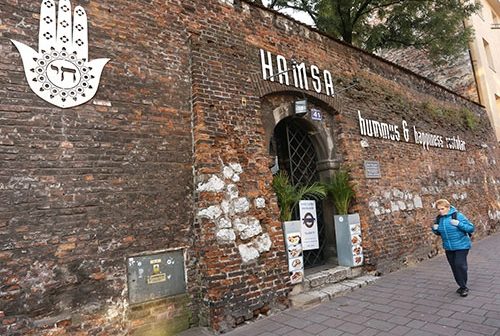Prominent Representatives of the Landau family from Kraków
Moses of Nuremberg, who lived in the sixteenth century, was an ancestor of the distinguished Landau family from Kraków, whose name comes from the town of Landau. His descendants in the main distinguished themselves, with many scientists achieving well-earned success, political figures holding high positions, and others making a considerable contribution in the field of humanitarianism.
Rafał Saul Landau was born in 1869. He gained a PhD in Law, was a city councillor, the guardian of refugees during World War I, and an activist within many humanitarian organizations. After being deported to the Soviet Union, he died in exile.
Jan Landau was born in Kraków in 1971. After achieving an MD, he became a hospital director and was also active in charity, aid and professional organisations. He was awarded the Order of Polonia Restituta and was a supporter of assimilation.
Ignacy Landau, who was born in Kraków in 1870 and died in 1934, had a PhD in Law, was an attorney, city councillor, supporter of assimilation, president of Kraków on two occasions, a social activist and an opponent of Hasidism. He was solemnly buried in the Kraków cemetery in Miodowa Street in 1934.
In Kazimierz, on the north side of ul. Szeroka, stands the so-called Landau Palace which once belonged to the family. The present form of the building is the result of combining three brick constructions in the thirteenth century and, rather fortuitously, the barrel vaults and fluted columns have been preserved inside it, including in the entryway. Currently, the building houses a bookshop and a restaurant on the ground floor. (Z. Łuczyńska)
Rafał Saul Landau was born in 1869. He gained a PhD in Law, was a city councillor, the guardian of refugees during World War I, and an activist within many humanitarian organizations. After being deported to the Soviet Union, he died in exile.
Jan Landau was born in Kraków in 1971. After achieving an MD, he became a hospital director and was also active in charity, aid and professional organisations. He was awarded the Order of Polonia Restituta and was a supporter of assimilation.
Ignacy Landau, who was born in Kraków in 1870 and died in 1934, had a PhD in Law, was an attorney, city councillor, supporter of assimilation, president of Kraków on two occasions, a social activist and an opponent of Hasidism. He was solemnly buried in the Kraków cemetery in Miodowa Street in 1934.
In Kazimierz, on the north side of ul. Szeroka, stands the so-called Landau Palace which once belonged to the family. The present form of the building is the result of combining three brick constructions in the thirteenth century and, rather fortuitously, the barrel vaults and fluted columns have been preserved inside it, including in the entryway. Currently, the building houses a bookshop and a restaurant on the ground floor. (Z. Łuczyńska)

Wybitni przedstawiciele krakowskiego rodu Landauów
Protoplastą znakomitego, krakowskiego rodu Landauów, których nazwisko pochodzi od miejscowości Landau, był w XVI wieku Mojżesz z Norymbergi. Jego potomkowie w dużej większości odznaczali się wieloma cennymi zaletami, bądź jako naukowcy czy działacze polityczni piastujący wysokie funkcje, lub osoby zasłużone w dziedzinie humanitaryzmu.
Rafał Saul Landau urodzony w 1869 r. dr. praw, radny miejski, opiekun uchodźców podczas I Wojny Światowej, działacz wielu organizacji pomocowych i humanitarnych. Wywieziony w głąb ZSRR zmarł na zesłaniu.
W roku 1971 urodził się w Krakowie Jan Landau, późniejszy dr. medycyny, dyrektor szpitala, działał w oganizacjach pomocowych, charytatywnych, zawodowych. Odznaczony Orderem Polonia Restituta. Zwolennik asymilacji.
Ignacy Landau ur. w Krakowie w 1870 r. (zm. w 1934 r.) dr. praw, adwokat, radny miejski zwolennik asymilacji, dwukrotny prezydent Krakowa, działacz społeczny, przeciwnik chasydyzmu. Został uroczyście pochowany w 1934 r. na krakowskim cmentarzu przy ulicy Miodowej.
Na Kazimierzu wzdłuż północnej pierzei ulicy Szerokiej, znajduje się tzw. Pałac Landauów, należący kiedyś do rodziny Landauów. Obecna forma budynku jest wynikiem scalenia wXVIII wieku trzech murowanych kamienic. We wnętrzu szczęśliwie zachowały się sklepienia kolebkowe, także w sieni, i żłobkowane kolumny. Obecnie na parterze mieszczą się księgarnia i restauracja.
Rafał Saul Landau urodzony w 1869 r. dr. praw, radny miejski, opiekun uchodźców podczas I Wojny Światowej, działacz wielu organizacji pomocowych i humanitarnych. Wywieziony w głąb ZSRR zmarł na zesłaniu.
W roku 1971 urodził się w Krakowie Jan Landau, późniejszy dr. medycyny, dyrektor szpitala, działał w oganizacjach pomocowych, charytatywnych, zawodowych. Odznaczony Orderem Polonia Restituta. Zwolennik asymilacji.
Ignacy Landau ur. w Krakowie w 1870 r. (zm. w 1934 r.) dr. praw, adwokat, radny miejski zwolennik asymilacji, dwukrotny prezydent Krakowa, działacz społeczny, przeciwnik chasydyzmu. Został uroczyście pochowany w 1934 r. na krakowskim cmentarzu przy ulicy Miodowej.
Na Kazimierzu wzdłuż północnej pierzei ulicy Szerokiej, znajduje się tzw. Pałac Landauów, należący kiedyś do rodziny Landauów. Obecna forma budynku jest wynikiem scalenia wXVIII wieku trzech murowanych kamienic. We wnętrzu szczęśliwie zachowały się sklepienia kolebkowe, także w sieni, i żłobkowane kolumny. Obecnie na parterze mieszczą się księgarnia i restauracja.
Die nördliche Frontfassade der Straße ul. Szeroka schließt der sog. Landau-Palast ab, der im 18. Jh. aus drei miteinander verbundenen, aus dem 16. Jh. stammenden Häusern entstand. Dies war einst der Sitz der verdienten jüdischen Familie Landau. Deren Vertreter zeichneten sich durch ihre hervorragende Ausbildung – Ärzte, Rechtsanwälte – sowie ihr gesellschaftliches und politisches Wirken aus. Sie waren Befürworter der Assimilation.










